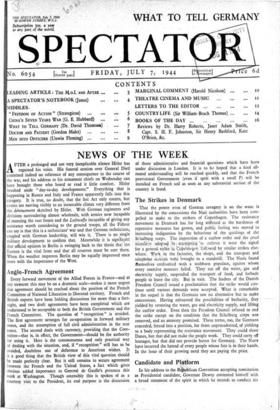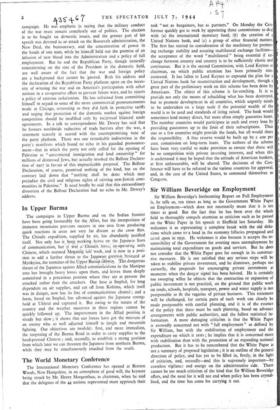Candidate and Platform
In his address to the Rebublican Convention accepting nomination as Presidential candidate, Governor Dewey contented himself with a broad statement of the spirit in which he intends to conduct his
campaign. He was emphatic in saying that the military conduct of the war must remain completely out of politics. The election is to be fought on domestic issues, and the greater part of his speech was devoted to an attack on the Roosevelt administration, the New Deal, the bureaucracy, and the concentration of power in the hands of one man, while he himself held out the promise of an infusion of new blood into the Administration and a policy of full employment. But he and the Republican Party, though naturally concentrating on the sins of the President in the domestic field, are well aware of the fact that the war and foreign policy are a background that cannot be ignored. Beth his address and the declaration of the Republican Party platform agree on the neces- sity of winning the war and on America's participation with other nations in a co-operative effort to prevent future wars, and he rejects a policy of extreme isolationism. He has refrained from committing himself in regard to some of the more controversial pronouncements made at Chicago, reiterating as they did faith in protective tariffs and urging that protection of the domestic market against foreign competition should be modified only by reciprocal bilateral trade agreements. In a talk to correspondents Mr. Dewey has said that he favours worldwide reduction of trade barriers after the war, a statement scarcely in accord with the uncompromising tone of the party platform. There was one remarkable indiscretion in the party's manifesto which found no echo in his guarded pronounce- ment—that in which the party not only called for the opening of Palestine to " unrestricted immigration and land ownership " for millions of distressed Jews, but actually invoked the Balfour Declara- tion of 1917 in favour of this impracticable proposal. The Balfour Declaration, of course, promised nothing of the kind, but on the contrary laid down that "nothing shall be done which may prejudice the civil and religious rights of existing non-Jewish com- munities in Palestine." It need hardly be said that this extraordinary distortion of the Balfour Declaration had no echo in Mr. Dewey's address.



























 Previous page
Previous page